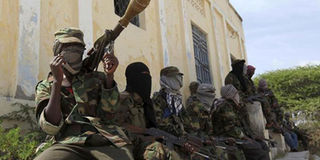UN moves to curb Al-shabaab cash points

It is estimated that Al-Shabaab obtains $10 million every year through levies it imposes on the charcoal trade in areas under its control. AFP PHOTO
What you need to know:
- According to the UN, the United Arab Emirates, Bahrain, Kuwait and Oman are major markets for Somali charcoal exports.
- The world body says that implementation of the 2012 ban has been poorly enforced.
Mogadishu: United Nations agencies operating in Somalia have teamed up to curb what they have called “unsustainable trade, production and use of charcoal in Somalia.”
Charcoal trade is one of the main cash-streams for the Al-shabaab militants.
The agencies have opened a two-day conference in Somalia’s capital, Mogadishu, in the wake of a recent resurgence in charcoal trade, which had dropped in 2015 and 2016.
The Al-Shabaab have been partly blamed for facilitating illegal charcoal trade and they export it to some gulf countries via the Jubbaland state.
The Conference which is supported by the UN Development Programme, the UN Environment agency and the UN Food and Agricultural Organization also brings together environmentalists, diplomats and academics as well as officials from the Federal Government of Somalia.
They are meeting to discuss ways of curbing the charcoal trade and its impact on Somalia’s fragile environment.
Somalia’s Deputy Prime Minister, Mahdi Mohamed Guled, has thanked the international community for helping the country against the vice.
Mr Guled noted that the Somali government had lobbied the United Nations to impose a ban on the charcoal trade in 2012 to preserve the environment and also eliminate a vital source of funding for armed groups.
“The Federal Government of Somalia is committed to reducing the charcoal consumption by identifying sustainable sources of energy to reverse the impending threat against Somalia’s fragile eco-systems,” Mr. Guled said.
Illegal charcoal trade continues to fund insecurity and conflict.
It is estimated that Al-Shabaab obtains $10 million every year through levies it imposes on the charcoal trade in areas under its control.
The officials argue that besides fuelling the militants' capacity, the illegal trade contributes to frequent drought cycles, flooding, the loss of livelihoods and an increase in food insecurity.
The Deputy Prime Minister said that there is a need to develop alternative energy systems to strengthen the ban on the charcoal trade in Somalia.
“We have natural, God-given solar energy, we also have lots of wind which can generate energy for cooking and other uses, and also gas which is cheaper to utilize,” Mr Guled added.
According to the UN, the United Arab Emirates, Bahrain, Kuwait and Oman are major markets for Somali charcoal exports.
The world body says that implementation of the 2012 ban has been poorly enforced.




